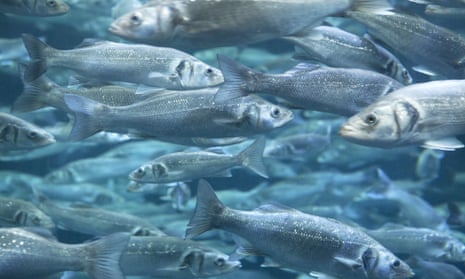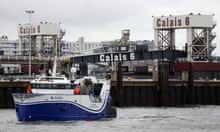The European commission has proposed closures on commercial fishing for sea bass in the Atlantic and whiting in the waters west of Scotland from next year, in order to prevent a collapse in fish stocks.
The total allowable catch (TAC) for cod in the Celtic Sea will also be cut by 68% under the plan, while sole quotas in the Irish Sea will be trimmed by a hefty 82%.
The move, to cut sea bass catches from 570 tonnes a year to zero, follows what the EU calls “very alarming” advice from fisheries scientists, who found that numbers had fallen below “safe biological limits”.
The same was true for Celtic cod, although cod from the North Sea which makes up a much higher percentage of British catches is in a healthier state and will be unaffected.
“Celtic Sea cod could collapse,” without the proposed limits, one EU official said. “There is a reason why scientists are recommending such harsh proposals,” the source added. “There are just not enough fish in the sea.”
The official dismissed any hope that the share of overall fish catches allocated to the UK could change after Brexit. “This is not on the table,” the official told the Guardian.
A final decision on next year’s quotas will be taken by EU ministers at a summit in December. EU sources predicted a “very difficult” meeting at the council, where ministers traditionally vie to appear strong in defence of their domestic fishing industries.
The news for the UK’s fishermen from Brussels was not all bad. Quotas for sole in the western Channel will be raised 20%, and for haddock in the Irish Sea by 7%, while North Sea mackerel landings will also go up.
Exemptions from the sea bass embargo are slated for anglers, who will be able to catch 10 sea bass a month in 2017 – down from 30 – and for artisanal hook-and-line fishermen, whose catch limit will only be reduced to 10 tonnes a year.
But quotas for herring, whose numbers have plunged in recent years, will be cut by 16%.
A spokesperson for the Department for Environment, Food and Rural Affairs said: “Quotas play a crucial role in ensuring the sustainability of our stocks, striking a balance between a profitable fishing industry and flourishing marine environment.
“We will work hard in upcoming negotiations to secure the best possible deal for the UK fishing industry – both now, and for the future.”
The EU’s environment commissioner, Karmenu Vella, said: “We need to bring all stocks to healthy and sustainable levels as soon as possible so that our fishing industry can remain viable. We are proposing an ambitious programme for 2017 and the only way forward will be to work with fishermen, scientists and national authorities to develop real solutions that lead to fisheries that are both economically profitable and sustainable.”
The EU’s common fisheries policy has promised to phase out overfishing by 2020, by imposing a maximum sustainable yield system that can lower or raise fishing quotas according to scientific advice about the health of stocks.
For 2017, the commission foresees a rise in TACs for sole in the western Channel, Norway lobster, anglerfish, haddock, hake and horse mackerel, mostly in the North Sea.
But big reductions have also been pencilled in for cod, sole, plaice, megrim and pollack in the Celtic and Irish Seas.
Conservationists welcomed the commission’s announcement. Lasse Gustavsson, the European director of charity Oceana, said: “Nearly half of all fish populations in the Atlantic - and particularly the North Sea - are being overfished. Any deviation from scientific advice would simply be irresponsible governance. The potential that stock recovery holds for the environment, and also for jobs in the fishing industry, is huge.”











Comments (…)
Sign in or create your Guardian account to join the discussion